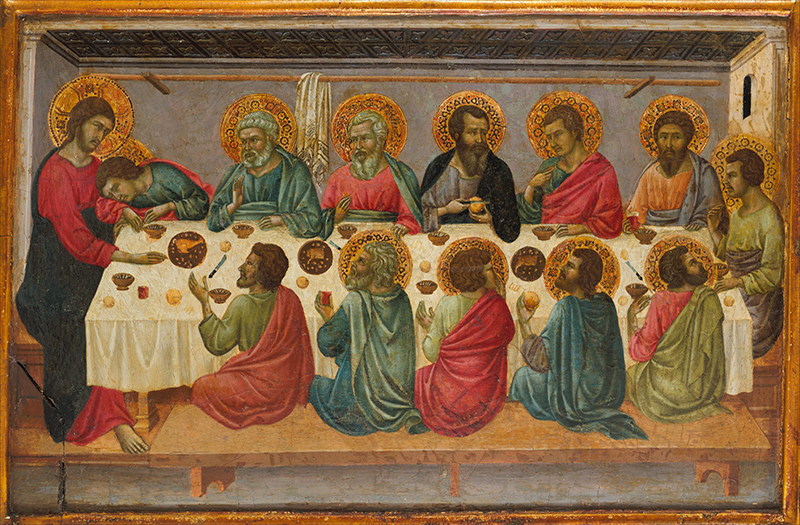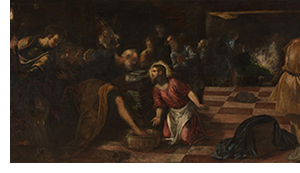
Holy Week: Last Supper and Footwashing
by The Revd Canon Dr Simon Jones, Chaplain and Fellow of Merton College, Oxford
- Download 'Last Supper & Footwashing' (PDF format)

Gabriel Jackson, The Passion of Our Lord Jesus Christ
(listen on Apple Music or Spotify)
libretto compiled by Simon Jones
Ave, verum corpus natum
de Maria Virgine,
Now when the even was come, Jesus sat down with the twelve. (Matthew 26.20)
Vere passum immolatum
in Cruce pro homine,
And as they were eating, Jesus took bread, and blessed it, and brake it, and gave it to the disciples, and said, Take, eat; this is my body.
And he took the cup, and gave thanks, and gave it to them, saying, Drink ye all of it;
For this is my blood of the new testament, which is shed for many for the remission of sins. (Matthew 26.26-28)
Ubi caritas et amor, Deus ibi est.
Congregavit nos in unum Christi amor.
Supper being ended, the devil having now put into the heart of Judas Iscariot, Simons son, to betray him; (John 13.2)
Cujus latus perforatum
unda fluxit sanguine,
Jesus riseth from supper, and laid aside his garments; and took a towel, and girded himself. (John 13.4)
Esto nobis praegustatum
in mortis examine.
After that he poureth water into a bason, and began to wash the disciples feet, and to wipe them with the towel wherewith he was girded. (John 13.5)
After he had washed their feet, he said unto them, Know ye what I have done to you?
Ye call me Master and Lord: and ye say well; for so I am.
If I then, your Lord and Master, have washed your feet; ye also ought to wash one another’s feet.
For I have given you an example, that ye should do as I have done to you. (John 13.12-15)
Exultemus, et in ipso jucundemur.
Timeamus, et amemus Deum vivum
Et ex corde diligamus nos sincero.
Ubi caritas et amor, Deus ibi est.
Author unknown
(Antiphon during the Washing of the
Feet and Vespers on Maundy Thursday)**
Jesus was troubled in spirit, and said, Verily, verily, I say unto you, that one of you shall betray me.
Then the disciples looked one on another, doubting of whom he spake.
Now there was leaning on Jesus bosom one of his disciples, whom Jesus loved.
Simon Peter therefore beckoned to him, that he should ask who it should be of whom he spake.
He then lying on Jesus breast saith unto him, Lord, who is it?
Jesus answered, He it is, to whom I shall give a sop, when I have dipped it. And when he had dipped the sop, he gave it to Judas Iscariot, the son of Simon.
And after the sop Satan entered into him. (John 13.21-27)
O dulcis, O pie, O Jesu, Fili Mariae.
attrib. Pope Innocent VI (d.1362)
(Hymn to the Blessed Sacrament, Corpus Christi)*
Then said Jesus unto him, That thou doest, do quickly. He then having received the sop went immediately out: and it was night. (John 13.30)
*English translation:
Hail true body, born
of the Virgin Mary,
Who having truly suffered, was sacrificed
on the Cross for mankind,
Whose pierced side
flowed with water and blood,
May it be for us a foretaste [of heaven]
in the trial of death.
O sweet, O pious, O Jesus, Son of Mary.
**English translation:
Where charity and love are, God is there.
The love of Christ has gathered us into one.
Let us rejoice and delight in him.
Let us fear, and love, the living God
And may we love each other with a sincere heart.
Where charity and love are, God is there
The events of the Thursday of Holy Week are divided between three movements of the Jackson Passion. Today’s, like the Maundy Thursday liturgy itself, incorporates both Last Supper and footwashing, the Gospel narratives of Matthew and John in dialogue with two Latin liturgical texts: the Eucharistic hymn, Ave verum, attributed by Pope Innocent VI and written about a century after the foundation of the College; and Ubi caritas, the antiphon sung during the footwashing.
‘The love of Christ has gathered us into one’, sings the Ubi caritas; but it won’t—not this year. Gathering with others is impossible. We are confined to flats, houses, student accommodation, and hospital wards. Of course, if we share our living space with others, we can break bread with them, as we do whenever we have a meal together; we can even wash each other’s feet, if we want to. But this wouldn’t be an authentic celebration of Maundy Thursday: not because we may lack a priest, or the music we normally sing or listen to, or the sacred space, or the liturgical texts, all of which are important. It wouldn’t be authentic because the liturgy of Maundy Thursday is, first and foremost, a drama which explodes and redefines, rather than reinforces, our often too narrow definitions of household. It reminds us of our connection with and responsibility towards those outside our inner circle, those with whom, if it were left up to us, we would rather not gather. It is a liturgy for the other, not for the elect.
 On the night before his death, Jesus washes the feet of twelve disciples, including Judas Iscariot; on the night of his betrayal, he feeds all twelve of his disciples, including the betrayer. ‘For I have given you an example’, he says to them, ‘that ye should do as I have done to you’. To our shame, historically and in the present day, the Church has struggled, and continues to struggle, to ‘do as I have done to you’. We have been, and still often are, happy to wash feet and break bread alongside those with whom we bear a family likeness, and are equally happy not to notice those who, intentionally or not, we exclude or who do not feel welcome, whether because of race, ethnicity, disability, gender, age, sexuality, status, or lifestyle. These are not, of course, our modern-day Judases, far from it. The point about the dramatic liturgy of Holy Week is that each of us is called to play every part every year, to express symbolically the reality of our lives in its totality, and to allow it to be transformed by the reality of redemption in its fullness. As the great fourth century bishop, St Cyril of Jerusalem, says in one of his homilies to the newly-baptized: ‘What a strange and astonishing situation! We did not really die, we were not really buried, we did not really hang from a cross and rise again. Our imitation was symbolic, but our salvation a reality’.
On the night before his death, Jesus washes the feet of twelve disciples, including Judas Iscariot; on the night of his betrayal, he feeds all twelve of his disciples, including the betrayer. ‘For I have given you an example’, he says to them, ‘that ye should do as I have done to you’. To our shame, historically and in the present day, the Church has struggled, and continues to struggle, to ‘do as I have done to you’. We have been, and still often are, happy to wash feet and break bread alongside those with whom we bear a family likeness, and are equally happy not to notice those who, intentionally or not, we exclude or who do not feel welcome, whether because of race, ethnicity, disability, gender, age, sexuality, status, or lifestyle. These are not, of course, our modern-day Judases, far from it. The point about the dramatic liturgy of Holy Week is that each of us is called to play every part every year, to express symbolically the reality of our lives in its totality, and to allow it to be transformed by the reality of redemption in its fullness. As the great fourth century bishop, St Cyril of Jerusalem, says in one of his homilies to the newly-baptized: ‘What a strange and astonishing situation! We did not really die, we were not really buried, we did not really hang from a cross and rise again. Our imitation was symbolic, but our salvation a reality’.
Some parts in this drama of redemption are easier to play than others. We are all invited to be fed at the Last Supper. Jesus approaches each one of us to wash our feet. But then there are the other, more uncomfortable, roles that we are called to play: to forsake Jesus and flee with the frightened disciples; to deny him with Peter; to wash our hands of him with Pilate; and, not least, with Judas to betray him with a kiss. Believing that we are more faithful, more loyal, more courageous, more devout, more loving than these or any of the other characters who appear on the stage of this Holy Week is a spiritual trap that it’s not easy to avoid. Identification with them is an important element of this as much as any other Holy Week if our discipleship is to be renewed through our symbolic participation in the reality of Christ’s death and resurrection.
As we prepare for this year’s Maundy Thursday, may our inability to leave our households to celebrate the loving, self-giving service of Christ in footwashing and Eucharist challenge us to reflect afresh on what it means for us as individuals, households, communities and as a Church to ‘do as I have done for you’. May we use our imagination prayerfully to expand our vision of the parts we are called to play in this drama of salvation, and of who is included within the Ubi caritas, the ‘we’ whom Christ longs to gather into one. And may that inclusive, all-embracing vision lead us from contemplation into action, knowing that the Ave verum’s ‘true body’, whom we hail on the cross and on the altar, is the same body we are called to get down on our knees to serve, confident in our belief that ‘Where charity and love are, God is there’.
Lord Jesus Christ,
you have taught us
that what we do for the least of our brothers and sisters
we do also for you;
give us the will to be the servant of others
as you were the servant of all,
and gave up your life and died for us,
but are alive and reign, now and for ever.